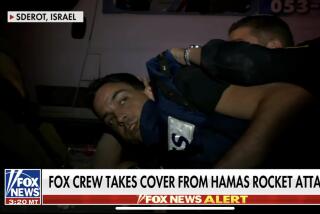TV AND THE GULF WAR : Victory Covered With a Sense of Celebration
Television’s coverage of the Gulf War on Wednesday already looked like a mop-up operation.
President Bush’s dramatic TV statement at 6 p.m. that “Iraq’s army is defeated” and that the allies were suspending offensive combat operations made it clear the nightmarish conflict could, indeed, be passing into history.
“This war turned 6 weeks old today. Few expect it to get much older,” Harry Smith, anchor of “CBS This Morning,” had said early Wednesday.
That was the TV picture, all right, as stories suddenly focused on such subjects as how to rebuild Iraq--and whether it should be allowed to have a sizable fighting force.
Almost nothing negative appeared on TV to dilute the celebratory atmosphere of the allied victory and the freeing of Kuwait city.
For a fleeting moment, CNN showed anti-American protesters in Amman, Jordan. But with polls indicating that 80% of Americans support the war, the conflict appeared to be winding down perfectly for TV, which always favors the majority.
KABC Channel 7, for instance, has promoted a clearly fearless report subtly titled “In Support of Our Troops.” And NBC titled one report “Bombs Over Baghdad,” which sounded like a World War II B movie.
If the U.S.-led coalition was using TV to humiliate Iraqi President Saddam Hussein worldwide in the possible last days of the war--to assure his demise--it was succeeding. At every political and military turn, he was belittled on TV.
The ultimate put-down came from Gen. H. Norman Schwarzkopf, commander of U.S. forces in the Gulf, in an hourlong briefing Wednesday carried by ABC, CBS, NBC and CNN.
A reporter lobbed one down the middle for Schwarzkopf, asking him to assess Hussein as a military leader, and the general knocked it out of the park.
“As far as Saddam Hussein being a great military strategist,” said Schwarzkopf, “he is neither a strategist, nor is he schooled in the operational art, nor is he a tactician, nor is he a general, nor is he a soldier. Other than that, he’s a great military man.”
The TV impact of the statement was such that it will probably be repeated in retrospectives for years, as Schwarzkopf delivered the line with impeccable, theatrical timing.
He was, in fact, in an obvious good mood, summing up the entire military conflict in a TV performance that told how victory was achieved.
“I’ll be very happy to take any questions,” he said at one point. In another sure TV sound bite that immediately was picked up after his session, he used football terminology--the “Hail Mary play”--to describe a maneuver.
He was even playful after one question: “You want me to speculate? I’ll be glad to speculate. Nobody can ever pin you down if you speculate.”
Schwarzkopf’s briefing was so colorful that ABC planned to rerun it in its entirety, with an introduction by Peter Jennings, after Wednesday’s “Nightline” broadcast.
But the allies put-down of Hussein on TV had heightened earlier with distrusting rejections of Iraqi offers to pull out of Kuwait.
Early Wednesday, Iraq’s latest attempt to come to terms caused another brief TV flurry, but White House Press Secretary Marlin Fitzwater quickly shot it down, saying it “falls far short” of allied demands.
The way things were going on the TV screen--victory in Kuwait city, Iraqi soldiers surrendering in large numbers--the allies clearly wanted nothing less than a total political wipeout.
CBS correspondent Richard Threlkeld said in Kuwait that six Iraqis surrendered to a CBS News crew, “which is an indication of how desperate they are.”
“I gave them some military rations and water,” he said.
And in another apparent worldwide TV maneuver to separate Hussein from other Arabs, the allied military briefing in Riyadh, Saudi Arabia--carried by CNN--was conducted by Col. Ahmed Al-Roboyan of the Joint Arab Forces.
There seemed to be far fewer censored TV reports Wednesday after the media breakout from pool reporting to cover the freeing of Kuwait city. And why would censors care that much anyway? Just about all the news was good for the allies.
Images will remain, however, of the bombed-out barracks in Saudi Arabia, where 28 Americans were killed and 100 wounded. And images will remain of the bombed-out bunker in Baghdad, where hundreds of Iraqis died.
But was it all finally ending? TV apparently thought so. On Wednesday, Tom Brokaw and Dan Rather were in Kuwait city to do their nightly newscasts, and Ted Koppel was set to present “Nightline” from Dhahran, Saudi Arabia, as the networks moved in for the kill.
More to Read
The complete guide to home viewing
Get Screen Gab for everything about the TV shows and streaming movies everyone’s talking about.
You may occasionally receive promotional content from the Los Angeles Times.






